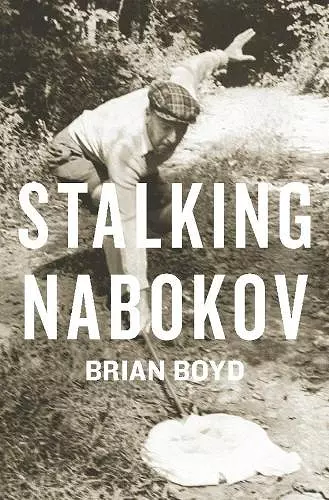Stalking Nabokov
Format:Hardback
Publisher:Columbia University Press
Published:18th Nov '11
Currently unavailable, and unfortunately no date known when it will be back

In this book, Brian Boyd surveys Vladimir Nabokov's life, career, and legacy; his art, science, and thought; his subtle humor and puzzle-like storytelling; his complex psychological portraits; and his inheritance from, reworking of, and affinities with Shakespeare, Pushkin, Tolstoy, and Machado de Assis. Boyd also offers new ways of reading Lolita, Pale Fire, Ada or Ardor, and the unparalleled autobiography, Speak, Memory, disclosing otherwise unknown information about the author's world. Sharing his personal reflections as he recounts the adventures, hardships, and revelations of researching Nabokov's life? oeuvre?, he cautions against using Nabokov's metaphysics as the key to unlocking all of the enigmatic author's secrets. Assessing and appreciating Nabokov as novelist, memoirist, poet, translator, scientist, and individual, Boyd helps us understand more than ever Nabokov's multifaceted genius.
At the age of twenty-one, Brian Boyd wrote a thesis on Vladimir Nabokov that the famous author called "brilliant." After gaining exclusive access to the writer's archives, he wrote a two-part, award-winning biography, Vladimir Nabokov: The Russian Years (1990) and Vladimir Nabokov: The American Years (1991). This collection features essays written by Boyd since completing the biography, incorporating material he gleaned from his research as well as new discoveries and formulations. Boyd confronts Nabokov's life, career, and legacy; his art, science, and thought; his subtle humor and puzzle-like storytelling; his complex psychological portraits; and his inheritance from, reworking of, and affinities with Shakespeare, Pushkin, Tolstoy, and Machado de Assis. Boyd offers new ways of reading Nabokov's best English-language works: Lolita, Pale Fire, Ada, and the unparalleled autobiography, Speak, Memory, and he discloses otherwise unknown information about the author's world. Sharing his personal reflections, Boyd recounts the adventures, hardships, and revelations of researching Nabokov's biography and his unusual finds in the archives, including materials still awaiting publication. The first to focus on Nabokov's metaphysics, Boyd cautions against their being used as the key to unlock all of the author's secrets, showing instead the many other rooms in Nabokov's castle of fiction that need exploring, such as his humor, narrative invention, and psychological insight into characters and readers alike. Appreciating Nabokov as novelist, memoirist, poet, translator, scientist, and individual, Boyd helps us understand more than ever the author's multifaceted genius.
A readable collection on one of the 20th century's greatest writers, this will be enjoyed by Nabokov fans and students of 20th century literature. Library Journal Boyd's graceful style and passionate advocacy achieves the goal of the best literary criticism: it compels us to pick up Nabokov and read, or read again, the work of a master. Publishers Weekly In Stalking Nabokov Boyd attempts something fairly ambitious: he takes the titanic Nabokov and seeks to revise him upwards. As Boyd sees it, he is not only the greatest novelist of the century; he is also a considerable poet, an important scientist, a controversially original translator, a fearless and liberating critic, a learned psychologist... Vera [Nabokov] soon came to value him and to trust him; and we should follow her lead... Professor Boyd, as the author of books on evolution and cognition, is well equipped to give us a real sense of Nabokov's scientific weight... The long and fervent essay in Stalking Nabokov [on the poem] "Pale Fire," compel us to reexamine the poem as an autonomous whole. And the exercise is epiphanic. "Pale Fire" glows with fresh pathos and vibrancy-and so does Pale Fire. For the first time we see the poem in all its innocence, and register the vandalism of Kinbote's desperate travesty.
ISBN: 9780231158565
Dimensions: unknown
Weight: unknown
464 pages